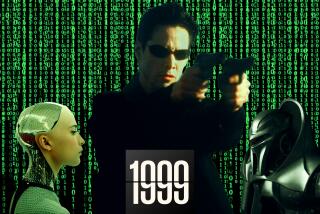Review: Reality or fantasy, ‘A Glitch in the Matrix’ argues that it’s always best to play nice
- Share via
As our daily lives have become increasingly chaotic, one popular explanation for the craziness is that our “reality” is actually an elaborate computer simulation. In Rodney Ascher’s docu-essay “A Glitch in the Matrix,” some smart-sounding people make the case that this theory isn’t just plausible, but obviously true — and profoundly alarming.
Like Ascher’s previous documentaries “Room 237” and “The Nightmare,” his latest relies heavily on a few highly articulate interview subjects, who are just confident enough perhaps to change a few minds. They’re also digitally masked to look like video game characters, an aesthetic choice that underscores one of the movie’s strongest points: that so many of us spend so much time online and exploring virtual worlds that our brains are evolving beyond the need for a literal truth.
“A Glitch in the Matrix” illustrates its observations with animation, footage from video games, snippets of viral videos, and copious clips from prescient science-fiction movies like “The Matrix” and “Total Recall.” Ascher also threads throughout the film a 1977 speech by author Philip K. Dick, in which he shocked his audience by insisting that our collective human memory is faulty.
“A Glitch in the Matrix” can feel a little scattered, as Ascher jumps from topic to topic, often dwelling the longest on the most disturbing stories. (The extended first-person testimony of a man who murdered his parents is especially tough to endure.)
But while the doc may be overlong, it’s consistently fascinating because of its implications. The nagging question that Ascher ultimately confronts is: So what? To believers and non-believers alike, “A Glitch in the Matrix” warns that — real or unreal — there are consequences to our actions. The best option is always to play nice.
'A Glitch in the Matrix'
Not rated
Running time: 1 hour, 48 minutes
Playing: Available Feb. 5 on VOD; and in limited release where theaters are open
More to Read
Only good movies
Get the Indie Focus newsletter, Mark Olsen's weekly guide to the world of cinema.
You may occasionally receive promotional content from the Los Angeles Times.










